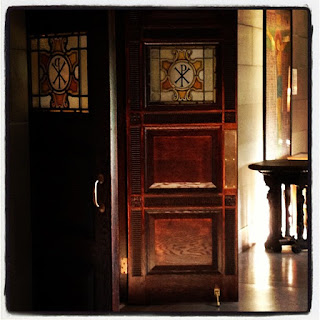
Four years ago, after my friend Robin lost her son, I wrote this piece about praying the psalms for the
Catholic Standard & Times. We say we can't imagine what it might be like to...lose a child, lose a spouse, lose a home. I wonder if it is less we can't imagine, but that we won't. Or perhaps we don't know how, how to prayerfully imagine such grief, how to give voice to anguishes we would rather not know about.
I cannot mourn the children who died today as their parents are and will, but I can chose to be present to their pain in my prayer. To take up the dark psalms of lament, the brutally honest canticles of the prophets, to let them stretch my heart. To imagine, in the tradition of Ignatius, the conditions that would wring such words from soul and mind.
I cry out until the dawn. Like a lion he breaks all my bones. Day and night you give me over to torment.
The night after Tom died, I woke up wailing in the night. My mother heard me, and came in to the room where I had finally collapsed into sleep, and held me, repeating over and over again that though there was nothing she could do to repair this grievous wound, she would be with me.
The psalms don't necessarily bring comfort or ease in grief, but like my mother, they are prayers that offer the chance to stand with those who mourn, whose one companion is darkness — as tonight's psalm for Compline will cry [Ps 88]. They let us do as Christ did, and weep. Can we take up these psalms of lament, and widen our hearts to share in those in inconsolable agony of spirit?
This column appeared in the Catholic Standard & Times 25 September 2008.
At the sight of her tears, and those of the Jews who followed her, Jesus said in great distress, with a sigh that came straight from the heart, “Where have you put him?” They said, “Lord, come and see.” Jesus wept. — Jn. 11:33-35
A friend lost her son last week, dragged from a long awaited retreat in silence into a maelstrom of pain. Over and over people told her that they could not imagine her grief. Perhaps what we really meant was that we did not want to experience her grief ourselves.
Returning to Bethany to find his friends Martha and Mary mourning their brother Lazarus, Jesus did not fail to imagine their grief, to experience this pain, though He could, and would, wipe it away in an instant. Jesus wept.
My friend sought the psalms in her grief. Not the green pastures and clear streams of Psalm 23, but the penetrating, inescapable love of Psalm 139. “If I make my bed in Sheol, You are there,” she prays.
Joseph Gelineau, S.J., whose now familiar psalm tones regrounded us in our own ancient chant traditions, said in his introduction to the Grail Psalter, “[the psalms] force us to widen our hearts to the full dimensions of redemption."
The psalms give us a way to voice the anguishes we have not experienced, the joys that might have never been ours, the fears that besiege and beset those around us. They force us to widen our hearts, and like Christ with Martha and Mary, be willing to go beyond acknowledging another’s pain, and imagine it. The psalms let us weep with each other.
In this way the psalms become for us more than the sacred songs of a generation long past, they are our own voices ringing in the wilderness of everyday life. As Andre Chouraqi, a distinguished Jewish theologian and linguist, noted, “We were born with this book in our very bones … 150 poems … 150 mirrors of our agonies and our resurrections.”
Literally, of course, the psalms are the skeleton upon which the Liturgy of the Hours, the Church’s daily work of prayer, hangs. On a deeper level, I find this image of the psalms as bones reminds me that these “150 mirrors” are not a superstructure shielding us from the difficulties of each other’s lives, nor are they an exoskeleton that bounds our growth.
Instead, they hold up for us what we need to see in our own lives, in the lives of those around us. They support us while we grow, through these shared experiences of joys and sorrows, virtues and transgressions.
As I prayed Psalm 139 this week, for my friend and for her son, it brought me back to the dark hours of a Holy Thursday more than 20 years ago. I sat in a hospital waiting room, facing the news that my husband would not live to see the morning. My breviary had disappeared in the chaos of the night before, but the psalms turned out to be in my bones and therefore my memory. When I could not hope, Psalm 30 could hope for me: “At night there are tears, but joy comes with dawn.”
The psalms still give voice to my griefs, my joys, my angers, my failings, my triumphs — they hold me up. They are my very bones. Through them we hold each other up. They are our very bones.



























